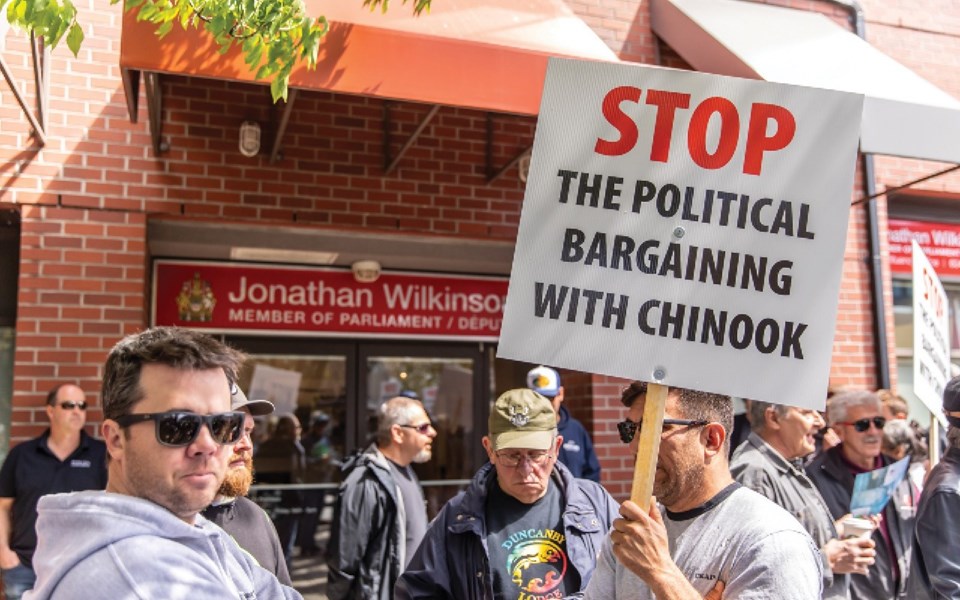Close to 200 protesters gathered outside of federal fisheries minister Jonathan Wilkinson's North Vancouver office last week to speak out against a decision to restrict Fraser River Chinook sportfishing that anglers are calling short-sighted.
Last month, Fisheries and Oceans Canada (DFO) announced mandatory catch-and-release restrictions for commercial and recreational anglers it says are intended to protect dwindling Chinook stocks. The restrictions, which are in place until July 31, limit anglers to one Chinook per day.
The DFO says the measures are needed to protect Chinook stocks that have been impacted by climate change and habitat destruction, with Fraser River Chinook particularly vulnerable due to increased sedimentation.
"The science is clear: Pacific Chinook salmon are in a critical state," read a statement from Wilkinson. "I want to ensure that we do not knowingly put these stocks on a path to extinction."
But anglers say the move fails to address the myriad root causes of the Chinook's decline and doesn't fall in line with the DFO's own research.
"There's no plan in place," said Whistler's Dave Brown, member of the Squamish-Lillooet Sportfish Advisory Committee, who co-organized the May 1 protest. "We're talking about issues that need to be addressed, and it starts in these rivers where these salmon lay their eggs, on the Upper Fraser watershed, where they are being hit hard by habitat degradation; there's water extraction from agriculture; there's lack of DFO enforcement presence in these areas. So they're already off to a bad start."
According to data from the DFO's Avid Anglers DNA program and creel survey, only 0.627 per cent of the Chinook harvested in the Southern Georgia Straight last year were from stocks of concern. "The overwhelming majority of the catch was from hatchery and healthy stocks—we know this by DNA evidence," explained Jason Assonitis, owner of Bon Chovy Fishing Charters in Vancouver, who has been involved in salmon data collection for the DFO.
"People need to realize that hundreds of different rivers contribute to local Chinook stocks, and a good portion are doing well."
Pamela Goldsmith-Jones, MP for West Vancouver-Sunshine Coast-Sea to Sky Country, explained that the rationale behind the decision was "really about those weak Fraser River stocks."
"The conservation issue is a real one and the risk to the future of these stocks is very high and we've known that for some time," she continued. "I think what's really challenging for people is those that feel they are not part of the problem—and never would be. (Anglers) are as interested in conservation as anyone, but aren't accepting that they create a risk to the mortality (of salmon). The belief is that even a small risk is too much."
Aside from the economic and social impacts of restricting recreational fishing, an industry that generates about $1.1 billion in annual income and employs roughly 9,000 people in B.C., the DFO is also potentially losing significant monitoring of Chinook populations regularly carried out by anglers through the Avid Anglers program and coded wire tagging, Assonitis noted.
"Now that the majority of the recreational fleet is off the water, the DFO does not have any measurable data sampling methods," he said. "In this year, 2019, there is virtually no accurate data. One of the only ways that we're going to get data is from people like me, who are involved in this Avid Anglers program, to go out on their own accord to get this data. There is no other data coming in.
"How are we supposed to continue to manage this resource with no way of getting data?"
Conservation groups have mostly welcomed the closure, while acknowledging that a more comprehensive management plan for Chinook is needed at the DFO.
"Fishery closures are always difficult, and (last month's) announcement from Fisheries Minister Wilkinson was no exception. But with Fraser River Chinook in crisis, it was the right thing to do," wrote the Watershed Watch Salmon Society in an April 16 Facebook post following the news. "We recognize and support this decisive action to protect endangered Fraser Chinook. We also appreciate the recognition in today's announcement that the Chinook crisis is inextricably linked to climate change. However, what is required, along with these changes in fishing regulations, is a comprehensive program to monitor effort, catch, releases, compliance, and stock composition of the catch. We will then be able to ascertain—come this time next year—whether these measures were effective.
"Several commenters here have pointed to other threats to endangered Fraser Chinook, like habitat degradation and salmon farms. We agree 100% that restricting fisheries is not enough and these other threats must be addressed head-on as well."
Goldsmith-Jones has committed to organizing a meeting between representatives from last week's protest and Minister Wilkinson to discuss the restrictions.




